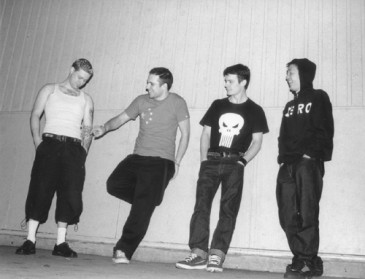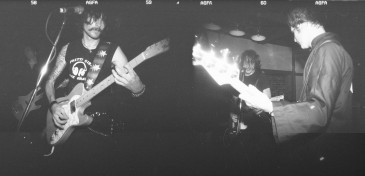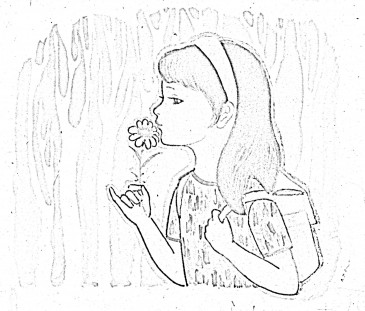Bottleneck is a new band with a recently-released CD which sets itself squarely in the alt-country/Americana camp. Its members have been active on the local roots scene for many years. Two members of Bottleneck (Scott Smith and Jeremy Holmes) backed up Butch Murphy in a former incarnation of Bughouse Five and, with drummer Liam MacDonald, continue to exercise their considerable playing chops most Saturday afternoons at the Railway Club jams.
Discorder chatted with Robyn Carrigan and Scott Smith, Bottleneck’s vocalists and songwriters, and took a run at penetrating the ethereal veil of the songwriting process.
Discorder: Who wants to field the “history” question?
Scott: Guess I will. Robyn and I met when we used to play in Auburn — I still play in that band. While I was still in Bughouse Five I had this catalogue of songs that were very personal, things that couldn’t really be done in that band. Butch Murphy’s a great lyricist, anyway. I needed a band to do this stuff, so I asked Robyn, and also asked Jeremy, who was also in Bughouse Five, and Liam, who I knew from the jams at the Railway. It started very casually, a gig every once in a while, and when we started recording this CD I thought we had something really good, something that should be our focus. As the band went along, Robyn started taking a bigger role. I originally thought it would just be my songs, but then I realized she has all these great songs and it’d be stupid not to use them.
So you both write—did you divvy it up half-and-half, or use the strongest songs when you recorded the album?
Scott: I think we used the strongest songs. Live, we were doing about 60/40 and that’s what came out on the CD. We co-wrote one tune, “Hate To See You Cry.”
Robyn: Even though we don’t co-write as a rule, I think we influence each other. Our songwriting styles are quite compatible. Since I’ve joined the band I’ve written specifically in a Bottleneck style, as opposed to songs I write for myself.
The first piece I ever wrote was called “The Picnic.” It consisted of starting out in the treble keys of the piano (the lovely sunny day part) and gradually working down to the bass end of the piano for the storm part, then back up again when the sun comes out. I was about four. I mentioned this to another musical friend, who informed me they had written the same song with their sister called “Birds and Thunder.” I started with lyrics at about age eight when my friend Brenda O’Brien and I wrote a musical comedy called the Farkel Family, based on something she saw on Saturday Night Live, about a very obese family who consumed and threw a lot of cream pies.
Since then, I’ve had many bands—Daisy Duke, Robyn Carrigan Band, and played solo. What I found in Auburn was that, with Scott, the melody lines we would pick would be the same, or we’d play them in harmony at the same time, so I thought we had a sympathetic musical ear.
How about you, Scott? Have you been writing songs a long time?
Scott: In Grade 8 I started writing songs. I always sang them, but I never had much confidence in my voice. It’s only in the last few years that I’m becoming known as a singer, instead of just a guitar player. Bughouse Five is probably the most recognizable band I was in. I play with Mac Pontiac, Pete Turland Band, Auburn, and I played with the Surfdusters way back.
Robyn, you’re from Nova Scotia. Did you have that East Coast kitchen party thing going on in your childhood?
Robyn: Yes, there was a lot of music in my family, in the house. I also had classical piano training, did Royal Conservatory, went to university and studied voice. In Pictou County, where I grew up, at least within my family, music was considered to be a really important thing, and was strongly encouraged. I had both sides of it: the Celtic/country side, and also the classically trained stuff, along with pop music.
Scott, you grew up here. Were there a lot of musicians in your family?
Scott: Not that I know of. I think I had a great-uncle who was a jazz musician. I grew up in Burnaby, started playing guitar when I was 12. Rock and roll stuff, you know.
When did you get more into roots and country music?
Scott: I’d say through the Rolling Stones and Bob Dylan, who were favourites since grade 8. The first Rolling Stones songs I liked were the ones everybody likes, and then I started getting into the country ones, like “Dead Flowers,” “Sweet Virginia.” And that leads to Gram Parsons, and then Gram leads you to Merle Haggard, and that leads to bluegrass and it just goes on like that. After awhile you love all this music, and it all started off from liking this English rock band.
Robyn: It was on the radio too, and my next-door neighbours were really into country music. My parents weren’t into country music, my brothers influenced me with Simon & Garfunkel, Bob Dylan. Gordon Lightfoot was a huge idol of mine as a child. I’d go to my neighbours and listen to Merle Haggard, Loretta Lynn, George Jones —the music I wasn’t allowed to listen to at home. It was theforbidden country music! [Laughs] That type of music has such great singers, so I was attracted to it for the singing, for the voices, the stories, the simple songs and the playing.
Do you find that the choice of your main instrument affects your songwriting, and do you have any set pattern in writing?
Robyn: I use the guitar as a writing tool, although voice is my “main instrument.” For me, lyrics and melody often come together. I’ll have a theme, or notion, about what I’d like to write about. Sometimes a turn of a phrase will come to me. Other times it’s a hook. You know, you’re playing along, and there’s a melody. But they very often come at the same time.
Scott: I’ve written songs in a number of ways, but the ones that always end up the best are the ones where a hook line comes at the exact same time as the melody: either part of the chorus or part of the refrain. The ones where you try and put an idea that you want to say to music turn out okay, but they never turn out great. The ones where there’s some element of luck involved are the good ones for me.
Another question about songwriting: are you scribblers? Do you sit and work at it, or do you wait to be hit by inspiration?
Scott: If I don’t have an idea, then I don’t work on songs. I work on pedal steel, or dobro, or something else that I need to work at. But if I have an idea for a tune, melody, bit of lyric, then the practicing of the instrument stops and I work on that. That could just take a few hours or it could take a week to get that song done.
Robyn: I’ve written songs in lots of different ways, and on lots of different instruments. Each instrument lends itself differently and has a potential for all these songs to come out. “High Prairie” on our album, for instance, is a banjo song. I don’t think I would’ve written it on the guitar. I will, however, tool away at songs. I will write a song and keep it around for a while and play it. If I don’t like it I won’t necessarily discard it; I’ll re-use part of the song for another song and recycle it.
Scott: Oh yeah, I do that too.
Robyn: I call it farm songs for the major songs —like farm teams for the major teams, you know? It’s been fun working with Scott because he’s a great sounding board. I’ll play a song that I won’t be crazy about, and he’ll pick out something about it that he likes. So it gives me inspiration to keep at a song if there’s something to hold on to. However, that being said, the best songs I’ve written have come out of really dramatic situations and very intense experiences. When you have those, it’s not something you can recreate or reproduce. Your heart gets broken again and boom, out come all these wonderful songs.
You’ve just answered part of my next question about what inspires you.
Robyn: Yes, bad relationships! Or just that exploration of emotion and self, and the human quest for evolution.
Scott: Everything on our CD pretty much was written from the “dramatic situation” standpoint. However, “Jay Woods” was inspired by my work at a youth detention centre, a prison for 13 to 18 year olds. That tune is a composite of stories I’ve heard there. There’s no guy named Jay Woods—I couldn’t name him under the Young Offenders Act anyway—but he’s a real person in that everything in that tune is something that somebody’s said to me. I wanted people to hear that experience. What you read in the paper is usually just about how young offenders should get more time [in jail] and somehow that’ll magically rehabilitate them and magically stop crime. The reality is that most young offenders in jail are kids from foster homes, kids who are addicted to drugs… most of them have been sexually and physically abused.
Have you ever played that song for the kids you work with?
Scott: I played it for some of them. One girl said: “Yup, that’s it.” That’s probably the biggest compliment I’ve ever got on one of my songs.
Do you draw on experiences of others, or do you tend to keep it more personal?
Robyn: On this album, I think most of the songs are relationship oriented, although “Abilene” is actually about missing Nova Scotia. And it came to me in a dream, that one: Dave Alvin and Alejandro Escovedo were standing on either side of a hospital bed. I was lying in the bed, and they were singing this song to me. I woke up and I wrote this song. Then, a couple of years later, Dave Alvin came out with an album, Blackjack David, with a different song called “Abilene” on it. Wasn’t that weird? And here’s another strange thing: Abilene makes almost a perfect equilateral triangle between Vancouver and Nova Scotia on the map!
I’ve written other songs—not on this album—about Nova Scotia. I wrote about the Westray mining disaster because my neighbour’s husband was killed in it. At one point I wrote quite a few politically-oriented songs that were from a personal viewpoint. But they’re not all autobiographical. Most of my songs have other people crying on my shoulders, telling me things. It’s a combination of all the relationships and situations, you draw a little bit from everything.
What other songwriters do you currently admire?
Scott: Ron Sexsmith. He’s my favourite songwriter right now. For a few years now.
Robyn: For a while I was listening to a lot of Iris Dement and Lucinda Williams. Matthew Sweet, because I like poppy things too. I like old Kinks. Because I play the accordion, I listen to a lot of old-timey music. Local songwriters influence me, too: Flophouse Jr., Jeanne Tolmie, Linda McRae, Shelley Campbell. We all hear each other’s songs all the time. Neko Case is a goddess!
Scott: Rich Hope, Butch Murphy. Both great songwriters.
What are your thoughts on th e local scene? Is there really a scene? Too many whiners?
Robyn: Musicians will always whine, of course, anywhere you go. That’s probably the nature of being artistic. I think the scene in Vancouver is fantastic. The only thing I would whine about is the lack of live venues. And going out to see live music is not generally a huge cultural draw in Vancouver because it’s very sporty, a newer city. But I think it’s a musician’s job, in a way, to make themselves popular. You have to inspire people and entertain them.
Scott: One thing I’ve found is that there’s nothing to be gained from putting other bands down or being competitive with each other. The more you praise other bands that you genuinely love, the more it just helps everybody. If I tell people how great Radiogram or Flophouse, Jr. are, I’ll do that. I wouldn’t refrain from doing that because they might steal my gig. If we work together and help each other out, then everybody benefits. At a lot of our gigs, it’s mostly musicians. We go see bands we like, then they come and see us, and so on. •
Bottleneck’s upcoming gigs include Grizfest (Tumbler Ridge) August 2-4, the Railway Club August 14, and the W.I.S.E. Hall September 14.
https://bottleneckband.tripod.com





